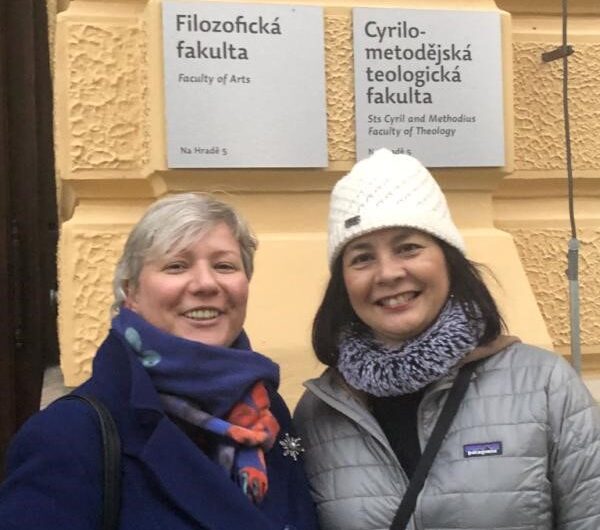You are in your first year as a dean of the National Catholic School of Social Service. What makes your school special? With what vision (plans) did you come into the position?
The National Catholic School of Social Service (NCSSS) is one of twelve schools at The Catholic University of America located in Washington, D.C., USA. NCSSS has a 100+ years of history of delivering social work education and a strong faculty, staff, and alumni committed to preparing social workers to be agents of change that will promote individual and societal well-being. The nationally ranked and accredited social work programs at the bachelor’s (BSW), master’s (MSW-on-campus and online) and doctoral (Ph.D.) levels, offer students a curriculum grounded in the justice and charity foundation of Catholic social teachings and the tradition of a modern university that welcomes all forms of human inquiry. It is the grounding of Catholic social teaching that sets our school of social service apart from other schools of social work. There is a richness of tradition in NCSSS where “service to others” is embedded in its mission and goals, and permeates every major initiative in our community of faculty, staff, students, and alumni.
The mission of the NCSSS is to educate students from diverse faiths and cultures who in their professional endeavors will embody the values of social justice, service, and scholarship. The tenets of this mission have been a prominent influence throughout my career as a social work practitioner and educator. Given the unique mission of NCSSS and position in a national university of the Catholic Church, my vision is to ensure this mission is the guiding priority in the development and implementation of the social work curriculum, research initiatives, and service opportunities. As the Dean of the National Catholic School of Social Service (NCSSS), my plans are to affirm the connection of Catholic social teaching with the mission and values of social work. Social work education represents the actualization of Catholic social teaching as it is intended to enhance human well-being and help address the basic human needs of all people, with attention to the needs and empowerment of people who are vulnerable, oppressed, and living in poverty. Articulating the connections between the mission of the university, Catholic social teaching and social work education is important for advancing teaching, research and service within the NCSSS, the university, our local community and the world.
Although COVID and being entirely virtual made it difficult to implement any plans in my first year as Dean, I am looking forward to growing international and community partnerships this year that will further articulate our “service to others” mission. My Fulbright experience in the Czech Republic allowed me the opportunity to discuss a number of potential partnerships with Czech social work programs through future online courses, conferences and exchange programs with faculty, staff and students. Our university also has a center in Rome where we can offer courses jointly for our social work students. This year we will focus on developing and implementing a collective strategic plan with input from the community, faculty, staff, students, alumni and other stakeholders. We are also undergoing a curriculum revision and focusing on integrating our macro and micro practice concentrations with the development of additional electives focused on this integration. We have also added a new course focused on theories of social and racial justice.
Your Fulbright research is focused on comparing the standards of social work education in the Czech Republic and the United States. What do you see as the main differences? Have you identified any intersections (commonalities)?
The main differences between our standards for social work education focus on the context in which the profession of social work and professional education have evolved in our countries. Modern social work has been developing in Europe and the U.S. since the 20th century as an independent profession. In the last thirty years, it has been dynamically developing in the Czech Republic as society in the Czech Republic has faced many social challenges since the political changes following the post-communist period beginning in 1989, when neo-liberal policies allowed the profession to establish itself in the educational and the legal systems as well as the social welfare structure. With the first educational programs for social workers at the university level being established 30 years ago, the standards of social work education have evolved that are responsive to the current economic, social and political conditions of the country.
In the U.S. social work became an occupation in the early 20th century and achieved professional status by the 1920s. The 1930 census classified social work as a profession for the first time. Social work education master’s programs have been accredited since the 1950’s and baccalaureate programs since 1974 so our standards have been evolving also in response to economic, social and political conditions of the country. Currently, the racial and social justice issues in the U.S. are having an impact on the current revision of standards in terms of how to address anti-racism, diversity, equity and inclusion in the social work curriculum.
Another difference in our accreditation standards is the framework utilized. The accreditation standards for social work in the Czech Republic are focused on a discipline framework relating to social work.
The framework utilized provides a graphic image of orientation of the social work discipline and the teaching content defining characteristics that include 12 areas:
- Philosophy and Ethics
- Basics of Sociological Theory
- Psychology in Social Work
- Theories and Methods of Social Work
- Practical Training
- Supervision
- Methods and Techniques of Social Research
- Basics of Law Theory and Practice
- Social Policy
- Social Pathology
- Minority Groups
- Health and Disease.
The output characteristics consist of skills (what a person can do) and knowledge (what a person knows) of a graduate. The educational goals are also a part of a study programme graduate profile that is overseen by the institution, which is accredited by the government board that oversees higher education institutions (The Association of Educators in Social Work, 2017).
The U.S. utilizes a similar approach to accreditation in that it is voluntary and peer-reviewed. However, social work programs are accredited by a non-governmental body, the Council on Social Work Education (CSWE), the sole accreditor of social work programs in the U.S., in order for their graduates to take the social work licensing exam after graduation. Thus, almost all social work programs seek specialized program accreditation through CSWE. The institutions that social work programs are housed in are also accredited by university regional accreditors
Another difference is the framework utilized for the social work accreditation standards. In 2008, the accreditation standards shifted from an input model of prescribing curricular content to the current competency-based model adopted by social work education programs in the United States. Competency-based education (CBE) refers to educational programs designed to ensure that students achieve competence in a given field or training activity. CBE is considered an approach to learning that includes educational goals that contain measurable objectives, that focuses on attainment of knowledge, attitudes, values, skills, and behaviors through an active learning environment. CBE has begun to gain more prominence as US higher education has shifted to a focus on student learning outcomes rather than what is being taught in the curriculum. The shift to a competency-centered, outcomes-based approach to accreditation and the emphasis for accreditors to focus their standards on assessing the degree to which institutions and programs are creating a skilled, competent, and globally competitive workforce have also contributed to this trend. In the context of accreditation, competencies can be used to articulate what students are expected to know and do upon graduation rather than what they are expected to learn about which is also a focus of the Czech standards for social work education.
However, in the U.S., quality assessment has moved from a model of curriculum design focused on content (what students should be taught) and structure (the format and organization of educational components) to one focused on student learning outcomes. Thus, the competency-based approach focuses on identifying and assessing what students demonstrate in practice. Rather than mandating the academic content that social work programs must provide, the standards now specify nine competencies of professional social work practice that include a set of measurable behaviors. Social work competence is the ability to integrate and apply social work knowledge, values, and skills to practice situations in a purposeful, intentional, and professional manner to promote human and community well-being. The social work competencies are defined at the generalist practice level and include:
- Competency 1: Demonstrate Ethical and Professional Behavior
- Competency 2: Engage Diversity and Difference in Practice
- Competency 3: Advance Human Rights and Social, Economic, and Environmental Justice
- Competency 4: Engage In Practice-informed Research and Research-informed Practice
- Competency 5: Engage in Policy Practice
- Competency 6: Engage with Individuals, Families, Groups, Organizations, and Communities
- Competency 7: Assess Individuals, Families, Groups, Organizations, and Communities
- Competency 8: Intervene with Individuals, Families, Groups, Organizations, and Communities
- Competency 9: Evaluate Practice with Individuals, Families, Groups, Organizations, and Communities (CSWE, 2015).
The competency-based approach involves assessing students’ ability to demonstrate these competencies and behaviors in practice situations. Through this orientation, programs begin the process of curriculum design with the outcomes, expressed as the competencies and practice behaviors, and then develop the substantive content, pedagogical approach, and educational activities that provide the learning opportunities necessary to develop competence. As in other professional disciplines, the competency-based approach was deemed particularly appropriate for social work since, rather than breadth of knowledge as the indicator of preparation as is the case in certain academic disciplines, competence is the necessary indicator of effective preparation for social work practice (Coe Regan & Dettlaff, 2016).
While the context and framework used for accreditation standards differ, there do exist commonalities in terms of how social work is defined as a profession and the curriculum content areas that are utilized in social work education programs. Specifically, both countries curriculum content includes a focus on ethics, theory and methods of social work, practical training, research, policy and working with diversity and difference (minority groups). Areas that differ include the focus on sociology and psychology (although often found in liberal arts education), law, social pathology and health and disease. Although social work in the U.S. does focus on these areas, these are part of specialized practice competencies that a social work program may decide to include in their curriculum. Specialized practice competencies are developed for concentrations in a MSW program and should extend and enhance the defined generalist social work competencies.
You have been professionally involved in the management and evaluation of the quality of educational programs in the USA for a long period. During your stay, you became familiar with the legislative and institutional framework of quality management in higher education in the Czech Republic. What interested you (or what did you notice)?
I have been interested in learning more about how the framework for quality management in the Czech Republic is done through the government whereas in the US, it is a non-governmental process, voluntary and done by peers. The government also defines the qualifications, training and competencies for the profession of social work in the Czech Republic. I had the privilege of meeting with staff from the National Accreditation Bureau for Higher Education, Ministry of Labour and Social Affairs and institutional accreditation experts to understand further how quality is determined in higher education. Quality is assessed differently in our countries. The Czech Republic is focused on reviewing the program of study, the structure and content of the study program, faculty outputs (e.g. number of publications, research, grants, etc) and other aspects of delivering the educational program. While this is also part of determining the quality of institutions and educational programs in the U.S., quality is also focused on student outcome measures such as retention, graduation and competence in the field of study. This data is used to improve the educational experience of students through changes to the explicit and implicit curriculum.
While both countries have standards of quality and a process to ensure this quality, neither of our systems seem to be well connected to the social work profession for which the educational programs are preparing students for. I am very interested in how this can be strengthened for future quality assurance processes. The Project Professionalization of Social Work in the Czech Republic (PROSO) that analyzed the process of professionalization of social work in the Czech Republic on a representative sample of social workers and creating a systematic description of 25 job positions of social workers is an ideal way to capture what social workers do so it can be connected to the quality standards for social work education. This is something I hope we can do more of in the U.S. and look forward to seeing a new version of the Minimum Educational Standard in Social Work that will be proposed for the bachelor’s and master’s level of study, which is used by the Association of Educators in Social Work and the National Accreditation Office, that is connected to the outcomes of the professionalization project.
I appreciate you being a Fulbright Scholar Award ambassador. For example, you have specifically supported several colleagues in their search for suitable research topics and potential partners in the US. Do you have any recommendations for Czech students and colleagues?
I would really encourage Czech students and colleagues to consider studying in the U.S. through the Fulbright program and other opportunities available. The Czech Fulbright Commission staff can be very helpful in connecting you with colleagues in the U.S. They assisted me in finding Dr. Tatiana Matulayová at Palacky University. I am also happy to assist anyone with locating colleagues and potential university partners. We do plan future collaborations such as lectures, joint courses and student-faculty exchanges as a result of the Fulbright so I hope faculty and students will be a part of these opportunities in the future.
What did winning a Fulbright scholarship and staying in the Czech Republic bring you personally?
My Fulbright experience in the Czech Republic has been a wonderful opportunity for growth and learning for my family and I. I am grateful that the Fulbright allows you to bring your family as it is a unique opportunity to experience together. We have enjoyed living abroad, especially in Olomouc, and experiencing the city and university. It is a beautiful city and we appreciated that there was always something going on with music, sports and other cultural opportunities this summer.
We have also appreciated learning more about Czech and Slovak history, culture, the people and exploring the country and other parts of Central Europe. We have found the Czech and Slovak people to be warm and hospitable. We have learned a lot about what it means to grow up in the Czech Republic, especially pre and post communism, and enjoyed hearing about people’s personal experiences and journeys related to this.
I also had the opportunity to visit other universities and social work programs in the Czech Republic to compare and contrast social work and international education. Each university has a different context and approach to social work and I have learned a lot that I can take back to my university that will help to improve the educational experience for our students. I especially appreciated the opportunity to be in a social work department that is part of a School of Theology given my role at a Catholic university in the U.S. It was personally very rewarding to meet colleagues from other disciplines represented in the school and university as I learned a great deal about other areas that can impact social work education like moral theology, ethics, political science and social pedagogy. My hope is to continue our collaborations together so we can learn from each other and have our students and faculty benefit from this mutual exchange of knowledge and ideas. This experience of being in the Czech Republic has given me renewed energy and passion as I start a new school year and am very grateful for the opportunity to be a U.S. Fulbright Scholar in the Czech Republic and at Palacky University in Olomouc!
Tatiana Matulayová,
předsedkyně Asociace vzdělavatelů v sociální práci
References
Association of Educators in Social Work. (2021). ASVSP Association of educators in the field of social work minimum standard of education in social work. Retrieved from http://www.asvsp.org/wp-content/uploads/2018/02/standard_sw_education_cz.pdf
Coe Regan, J. R., & Dettlaff, A. J. (2016). Understanding and assessing competence: Challenges associated with the competency-based approach to social work education.
In I. Taylor, M. Bogo, M. Lefevre, & B. Teater (Eds.), Routledge international handbook of social work education (pp. 27–37). New York, NY: Routledge International.
Council on Social Work Education. (2015). Educational policy and accreditation standards. Retrieved from https://www.cswe.org/getattachment/Accreditation/Standards-and-Policies/2015-EPAS/2015EPASandGlossary.pdf.aspx







